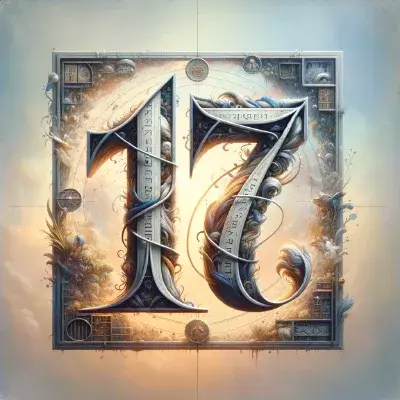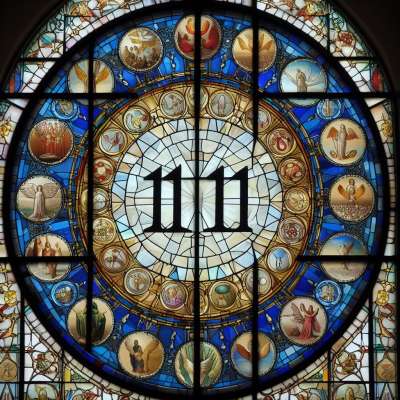Unraveling the Divine Tapestry: The Profound Meaning of the Number 12 in Biblical Narratives

The number 12, recurrent in biblical passages, holds profound spiritual significance. Historically representing completeness and order, it’s interwoven with stories of tribes, disciples, and celestial occurrences. As we explore its presence in sacred scripture, a richer understanding of its divine resonance emerges, illuminating its role in guiding ancient faith and practice.
I. Introduction
From the dawn of religious texts, numbers have always possessed a deeper, symbolic significance beyond mere counts. As we delve into the world of biblical interpretation, the number 12, in particular, stands out as a symbol with a profound presence and meaning.
A. Historical significance of numbers in scripture
Ancient scriptures across various cultures have long utilized numbers as symbols representing deeper truths and spiritual concepts. Within the Christian Bible, numbers such as 3, 7, and 40 are often cited, each holding its unique meaning.
B. Overview of the number 12’s recurrence in the Bible
The number 12 is a consistent figure throughout the biblical narrative. Whether referencing tribes, apostles, or months, its repetitive emergence underscores its importance in conveying spiritual truths and historical events.
II. Historical Context
Biblical numbers often derive their significance from broader ancient contexts, understanding which can provide deeper insights into their religious meanings.
A. Ancient civilizations and the significance of numbers
Many ancient civilizations, from the Babylonians to the Greeks, regarded certain numbers with reverence, often associating them with deities, celestial bodies, or significant events. Such historical precedents paved the way for the Bible’s numerological interpretations.
B. Biblical numerology: an overview
Biblical numerology is the study of numbers within the Holy Scriptures. This discipline goes beyond the literal to unveil the spiritual and prophetic layers beneath the text, highlighting God’s design in the grand narrative.
III. Twelve Tribes of Israel
The story of Israel’s formation is intimately tied to the number 12, a figure symbolizing unity, purpose, and divine orchestration.
A. Origin and significance of the tribes
The Twelve Tribes originated from the twelve sons of Jacob, later known as Israel. Each tribe not only represented a distinct lineage but also held a unique role and destiny within the greater narrative of the Israelite nation.
B. Role in the formation of Israelite nationhood
The tribes played a crucial role in establishing Israel’s identity, territory, and spiritual mission. Their collective journey, from Egyptian captivity to the Promised Land, serves as a testament to God’s faithfulness and divine plan.
IV. The Twelve Apostles
The New Testament introduces us to twelve key figures who would play a foundational role in spreading Christ’s teachings and establishing the early Christian Church.
A. Selection and significance
Jesus handpicked twelve apostles from various backgrounds. Their diversity showcased God’s inclusive call, while their unified mission underlined the transformative power of the Gospel.
B. Their foundational role in Christianity
The apostles were instrumental in laying the foundation of Christianity, spreading the teachings of Jesus, and penning much of the New Testament. Their legacy continues to shape Christian theology and practice today.
V. Other Biblical References
Beyond tribes and apostles, the number 12 surfaces in other significant biblical contexts, further accentuating its importance.
A. Twelve months of the Hebrew lunar calendar
The Hebrew calendar, consisting of twelve lunar months, aligns with the agricultural cycles of ancient Israel and holds various religious observances and festivals.
B. The 12 gates of the New Jerusalem
Revelation speaks of a heavenly city with twelve gates, each named after one of the tribes, symbolizing God’s eternal kingdom and the unity of His people.
C. Twelve loaves of the Showbread
In the temple, twelve loaves of bread were placed weekly as a perpetual offering, symbolizing God’s constant provision and presence among His people.
VI. Symbolism and Interpretation
The repetitive occurrence of the number 12 throughout the Bible isn’t a mere coincidence. It’s laden with symbolism that bridges the ancient to the contemporary.
A. Representations of completeness and order
The number 12 often signifies completeness and divine order, from the tribes that complete the nation of Israel to the apostles who represent the fullness of the Church.
B. Connections to cosmic and celestial occurrences
The 12 months align with the lunar cycle, connecting earthly time with heavenly patterns. This cosmic link underscores God’s orchestrated design in nature and history.
C. Contemporary interpretations and beliefs
Even today, theologians and believers explore the significance of the number 12, drawing parallels to modern faith practices and deriving inspiration for spiritual growth.
VII. FAQs
Q: Why is 12 a powerful number in the Bible?
A: The number 12 is frequently used in the Bible as a symbol of completeness and divine order. Its prominence is seen in instances such as the Twelve Tribes of Israel and the Twelve Apostles, signifying unity, completeness, and God’s divine orchestration.
Q: What does the number 12 mean spiritually?
A: Spiritually, the number 12 signifies wholeness, order, and perfection. It represents God’s power and authority, as well as the foundation upon which He established the universe and human experience.
Q: What Bible verse talks about 12?
A: Several Bible verses reference the number 12. One prominent example is Revelation 21:12, which describes the New Jerusalem with 12 gates, each named after one of the twelve tribes of Israel.
Q: What is the significance of the 12 stones in the Bible?
A: The 12 stones in the Bible, specifically in Joshua 4, signify a memorial for the twelve tribes of Israel. They were used as a reminder of God’s miraculous intervention when the Israelites crossed the Jordan River. These stones symbolize God’s faithfulness and the enduring legacy of the tribes.
Q: How does the number 12 relate to the Hebrew lunar calendar?
A: The Hebrew lunar calendar consists of twelve months, aligning with the agricultural cycles of ancient Israel and holding various religious observances and festivals.
Q: Are there any other biblical numbers with similar importance as 12?
A: Yes, numbers like 3, 7, and 40 also hold significant importance in the Bible, each carrying its unique spiritual symbolism and historical references.
Q: How has the significance of the number 12 evolved in religious contexts?
A: While the roots of its significance stem from ancient biblical narratives, the number 12 continues to be revered in modern religious practices, symbolizing unity, order, and divine completeness in various faith traditions.
VIII. Conclusion
A. The continued importance of the number 12 in Faith
The number 12’s enduring significance is a testament to its profound spiritual meaning, reminding believers of God’s eternal design and purpose throughout history.
B. Its influence on modern religious practices and beliefs
Modern religious practices, be it liturgical celebrations or theological studies, still echo the importance of the number 12, reinforcing its role as a bridge between the ancient and the contemporary.
IX. Suggested Readings
For those eager to delve deeper into the intriguing world of biblical numerology and its profound implications, here are some insightful reads:
- “Number in Scripture” by E.W. Bullinger: An exploration into the mystical and symbolic significance of numbers in the Bible.
- “Bible Numerics: The Works of Ivan Panin” by Ivan Panin: Delving into the intricacies of numerical patterns found in the Scriptures.
- “The Pattern & The Prophecy: God’s Great Code” by James Harrison: A comprehensive look into the divine design behind biblical numbers.
- “Numbers in the Bible: God’s Unique Design in Biblical Numbers” by Robert D. Johnston: A guide to understanding the deep spiritual truths conveyed through numbers.
- “The Secret of the Universe: God’s Design in Numbers” by Nathan R. Wood: A thought-provoking analysis of how numbers reveal divine truths about the universe.
Each of these books offers a unique perspective on the role of numbers in the Bible, providing readers with a richer understanding of the divine narrative.






